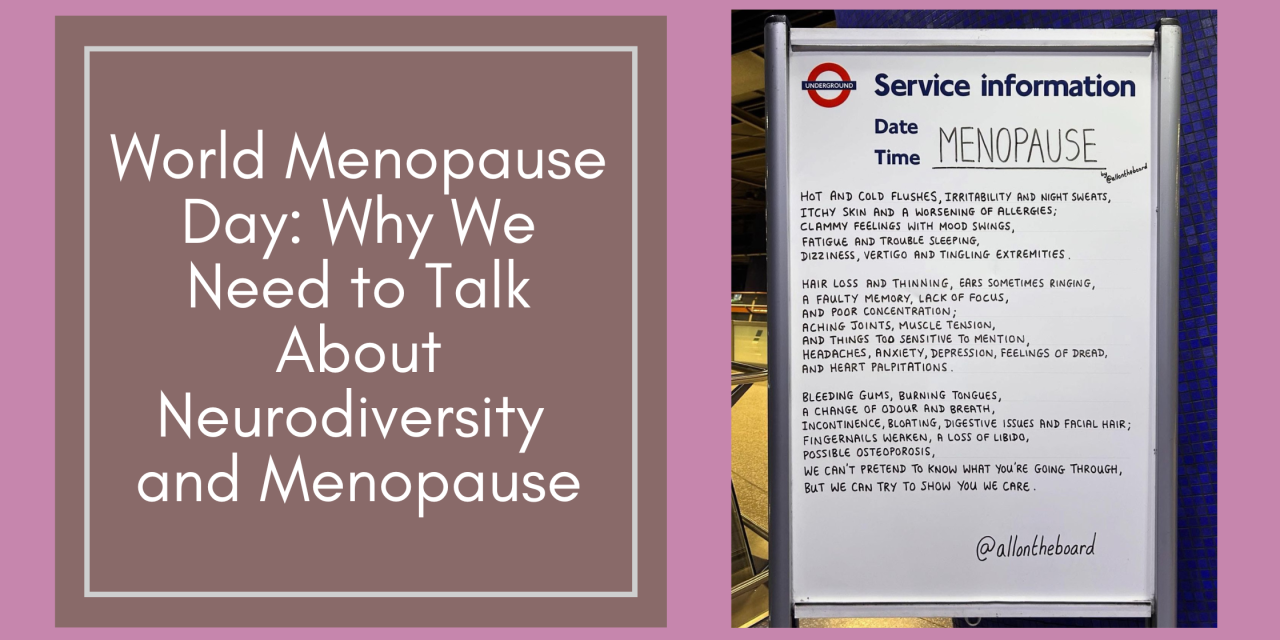Today is World Menopause Day, and as someone diagnosed with autism and ADHD who has been through the menopause and come out the other side, I want to say I stand with each and every one of you who is going through it too, not feeling like yourself anymore, and wondering if you ever will again.
But I also need to share something that isn’t discussed nearly enough, how differently menopause impacts those of us who are neurodivergent.
The Reality No One Talks About
When I hit perimenopause, my autism and ADHD traits became impossible to hide. I found that while throughout my life I could mask to fit into a world built for neurotypicals, suddenly I just couldn’t do that anymore. Many neurodivergent women find that menopause disrupts the coping skills they’d previously relied on, and for some of us, it’s actually during menopause that we finally receive our autism or ADHD diagnosis after years of struggling without knowing why. That was certainly the case for me.
The Perfect Storm
When our oestrogen levels drop, so does our dopamine which is critical for executive functioning. For those of us with ADHD already struggling with executive function, this creates severe cognitive dysfunction. While I was still able to function at work, I found I couldn’t function as well at home, and this annoyed the hell out of #HubbyRuss. What the hell was wrong with me, I thought. Why can’t I get things done like I used to? Why am I forgetting to turn off the washing machine, the lights and forget about doing things that I did every day before the menopause hit without a second thought?
There were some days I felt like I couldn’t even leave the house, as I was forgetting everything from my keys to my phone and more. My confidence, self-esteem and feelings of imposter syndrome took a massive dive and were off the charts. Worse, I discovered that not only could I not have medication for my ADHD due to it interacting with the daily eye drops I have to have when I was diagnosed with slightly elevated pressure in my eyes which if left unchecked could lead to glaucoma, I also couldn’t have HRT for the same reason. I had to go through the menopause completely unmedicated.
The woman who has a glittering and award-winning career in cyber security and tech, who’d built communities and raised awareness for years, suddenly couldn’t function. When menopause strips away these key abilities from us, it’s truly devastating, and we feel like we will never recover or be ourselves ever again.
What the Workplace Needs to Understand
I want to be clear, this isn’t about wanting or expecting special treatment. Neurodivergent individuals often experience more extreme symptoms during menopause. We need:
- Managers who understand that reasonable adjustments might be for our amplified ADHD or autism traits, not just hot flashes or the physical symptoms of menopause.
- Time and patience as we figure out what support we need, after all, we may not know ourselves – I certainly didn’t for a long time.
- Recognition that we’re possibly dealing with a late diagnosis of autism, ADHD or other neurodivergent condition on top of the menopause.
This Year’s Focus – Lifestyle Medicine
The 2025 theme of World Menopause Day emphasises how healthy eating, physical activity, mental wellbeing, quality sleep, and nurturing relationships can support menopausal health. But these strategies need adapting for neurodivergent brains, because our sensory sensitivities, executive function challenges and processing differences mean one-size-fits-all approaches don’t work.
My Call to Action
As someone with that strong sense of justice that comes with being #OpenlyNeurodivergent, I’m using my platform to say that we need to break this double stigma. I’ve been raising awareness in cyber security about neurodiversity for years, and now I’m adding menopause to that conversation. And I did this recently when I was a guest on the Talent First podcast with Michelle Edmonson, you can listen to my episode here – “Breaking the Silence: Navigating Neurodiversity, Menopause, and Imposter Syndrome in Cyber Security.”
To my fellow neurodivergent women approaching or experiencing menopause: you’re not going mad, you’re not failing, and you’re definitely not alone.
To employers – listening is one of the biggest ways you can show support, be patient and help us to understand in the workplace. We want to keep contributing our unique perspectives and talents.
Let’s make workplaces truly inclusive for every brain type and through every life transition.
I’d love to hear from other neurodivergent professionals about their menopause journey. What support made the biggest difference for you?
_____________________________________________________
I’ve also included a list of resources that I hope you will all find helpful:
World Menopause Day 2025 – Official Resources:
- International Menopause Society – World Menopause Day 2025 (Lifestyle Medicine theme and resources): https://www.imsociety.org/education/world-menopause-day-2025/
Neurodiversity and Menopause Information:
- Autistica – “Menopause and Autism” guide: https://www.autistica.org.uk/what-is-autism/autism-and-menopause
- The National Autistic Society – “Menopause” guidance for autistic people: https://www.autism.org.uk/advice-and-guidance/topics/physical-health/menopause
- Elektra Health – “Neurodiversity and Menopause”: https://www.elektrahealth.com/blog/elektra-digest/neurodiversity-and-menopause/
Workplace Support:
- Henpicked – “Neurodiversity and menopause: what employers need to know”: https://menopauseintheworkplace.co.uk/equality/neurodiversity-and-menopause-what-employers-need-to-know/
Additional Academic/Clinical Resources:
- Autistic Girls Network – “Hormones, Autism, and ADHD: The Hidden Struggles of Neurodivergent Women”: https://autisticgirlsnetwork.org/hormones-autism-and-adhd/
Living on The Spectrum – “Is it ADHD, Menopause or Autism?”: https://www.livingonthespectrum.com/health-and-wellbeing/autism-adhd-menopause/

























